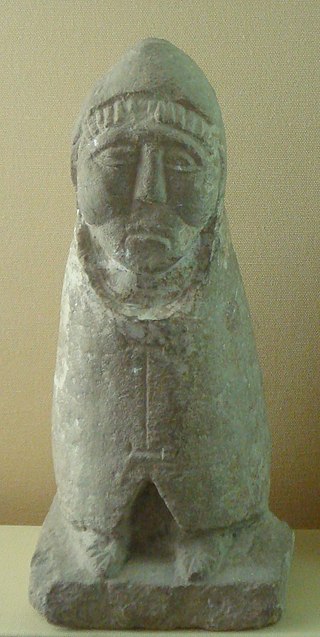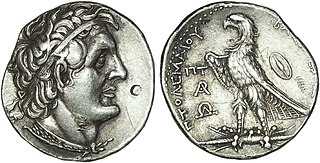See also
- Télesphore (disambiguation)
- Telesforo, a given name
Telesphorus may refer to:
Greek may refer to:
Nike often refers to:

Pope Sixtus I, also spelled Xystus, a Roman of Greek descent, was the bishop of Rome from c. 117 or 119 to his death c. 126 or 128. He succeeded Alexander I and was in turn succeeded by Telesphorus. His feast is celebrated on 6 April.
Roman or Romans most often refers to:
Zeno may refer to:
Porphyry may refer to:

Pope Telesphorus was the bishop of Rome from c. 126 to his death c. 137, during the reigns of Roman Emperors Hadrian and Antoninus Pius.

Pope Anacletus, also known as Cletus, was the bishop of Rome, following Peter and Linus. Anacletus served between c. AD 80 and his death, c. AD 92. Cletus was a Roman who, during his tenure as pope, ordained a number of priests and is traditionally credited with setting up about twenty-five parishes in Rome. Although the precise dates of his pontificate are uncertain, he "...died a martyr, perhaps about 91". Cletus is mentioned in the Roman Canon of the mass; his feast day is April 26.
Apollodorus was a popular name in ancient Greece. It is the masculine gender of a noun compounded from Apollo, the deity, and doron, "gift"; that is, "Gift of Apollo." It may refer to:

In ancient Greek religion, Telesphorus was a minor child-god of healing. He was a possible son of Asclepius and frequently accompanied his sister Hygieia. He was depicted as a dwarf whose head was always covered with a cowl hood or cap.
Hamilcar was a common Carthaginian masculine given name. The name was particularly common among the ruling families of ancient Carthage.
Heraclides, Heracleides or Herakleides in origin was any individual of the legendary clan of the Heracleidae, the mythological patronymic applying to persons descended from Hercules. As they were of the legendary tribe of the Dorians, the name in the classical age could mean anyone of Dorian background. The Dorians had their own group of dialects, which may or may not have been spoken by given individuals. Usage of the name was concentrated at Syracuse, a Dorian colony, Tarentum, a Spartan colony, and central Greece, legendary ancestral homeland of the Dorians, but they colonized the islands, Crete, and Anatolia as well. As a personal name, Heraclides may refer to:
Apollonius is a masculine given name which may refer to:

Ptolemy is a male given name, derived from Ancient Greek and meaning 'warlike'. It is formed from the Epic Greek πτόλεμοςptolemos meaning 'war'. The name was used throughout the Greek world, but was particularly popular in ancient Macedon and its nobility. During the Hellenistic period, Ptolemy I Soter, a general of Alexander the Great, founded the Ptolemaic dynasty which ruled their Kingdom in Ancient Egypt. All male rulers of the dynasty bore the name 'Ptolemy', the last being Ptolemy XII Auletes, father of Cleopatra. Common variants include Ptolemaeus (Latin), Tolomeo (Italian) and Talmai (Hebrew).

Timotheus is a masculine given name. It is a latinized version of the Greek name Τιμόθεος (Timόtheos) meaning "one who honours God", from τιμή "honour" and θεός "god". The English version Timothy is a common name in several countries.
Telesphorus was a nephew and a general in the service of Antigonus Monophthalmus, the ruler and later king of the Asian half of the empire conquered by Alexander the Great, who was sent by him in 312 BC, with a fleet of fifty ships and a considerable army to the Peloponnese, to oppose the forces of Polyperchon and Cassander. At first he was very successful; he drove Polyperchon’s garrisons from all the cities of the peninsula, except Sicyon and Corinth, which were held by Polyperchon himself; but having joined with Antigonid admiral Medius in an attempt to relieve Oreus on Euboea, to which Cassander had laid siege, he was beaten back, with the loss of several ships. The following summer, Antigonus having conferred the chief direction of the war in the Peloponnese upon his other nephew Ptolemy, Telesphorus was so indignant that he shook off his allegiance, and having induced some of his soldiers to follow him, established himself in Elis on his own account, and even plundered the sacred treasures at Olympia. He was, however, soon after, induced by Ptolemy to submit. Antigonus must have forgiven him because a few years later Telesphorus was on the staff of Demetrius, Antigonus’ son.

Terranova da Sibari is a town and comune in the province of Cosenza in the Calabria region of southern Italy. It is located on a hill between the river Crati and the last stretches of the Sila Mountains, at some 20 kilometres from the Ionian Sea. Refugees from the ancient city of Thurii founded Terranova after the destruction of their city in the war against Croton.

Calimerius was an early bishop of Milan. He is honoured as a Saint in the Catholic and Eastern Orthodox churches and his feast day is on July 31.

Amyntas is a male given name, a variation of ἀμύντης (amyntes), derived from the Ancient Greek: ἀμύντωρ (amyntor) 'defender, helper' and ultimately from the verb ἀμύνω 'to ward off, to defend'. It was particularly widespread in ancient Macedon, and was given to several prominent ancient Macedonian and Hellenistic figures. It later became a stock name for lovelorn shepherds in 16th-century pastoral literature.

The Galatians were a Celtic people dwelling in Galatia, a region of central Anatolia in modern-day Turkey surrounding Ankara during the Hellenistic period. They spoke the Galatian language, which was closely related to Gaulish, a contemporary Celtic language spoken in Gaul.